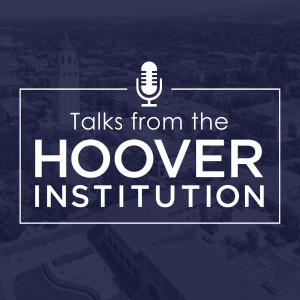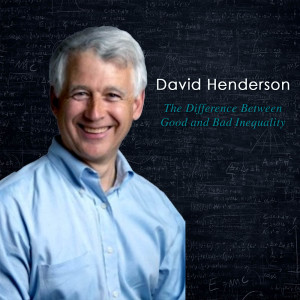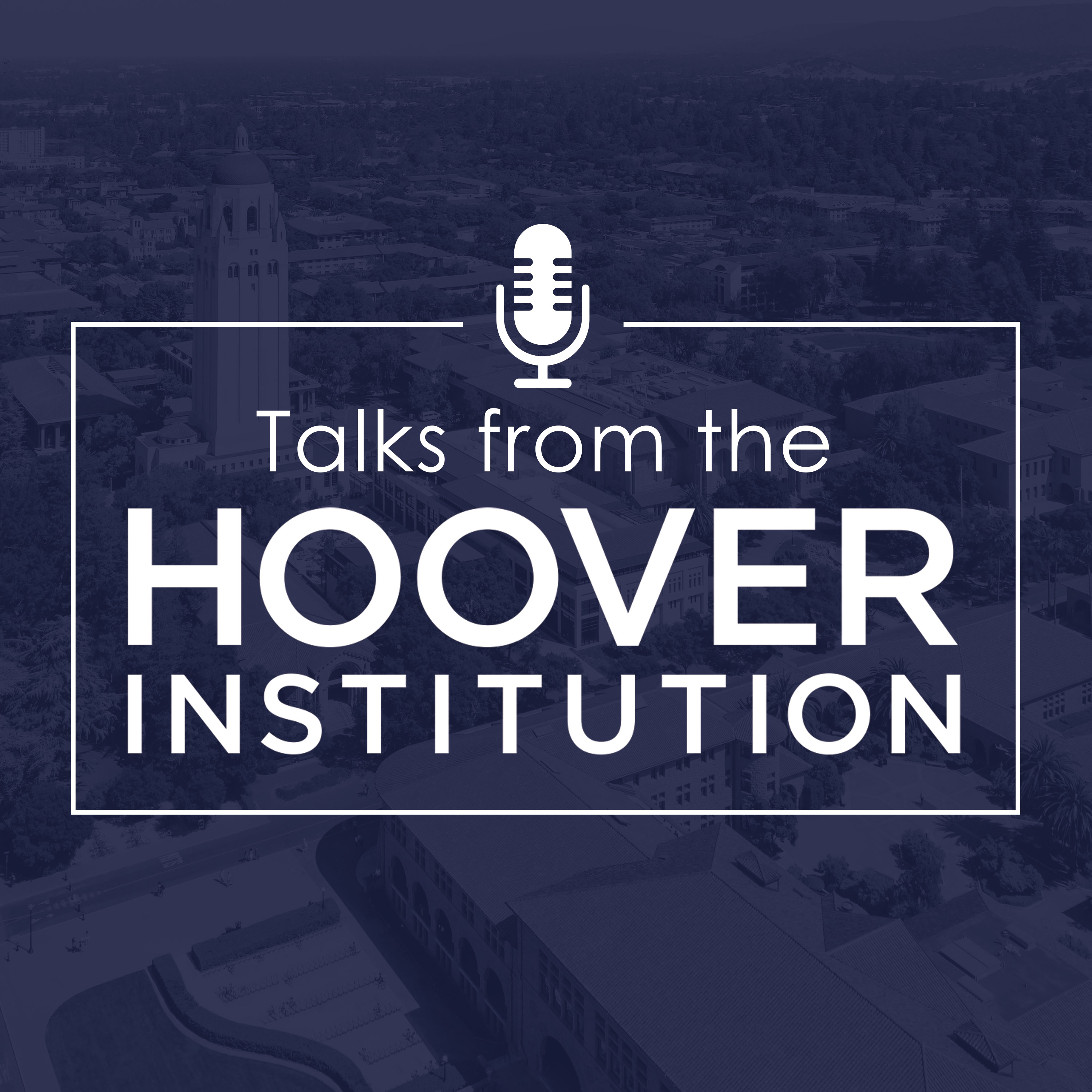Episodes

Thursday Sep 16, 2021
Will Increasing Teacher Pay Harm Students?
Thursday Sep 16, 2021
Thursday Sep 16, 2021
Momentum is growing for significant increases to teachers' salaries. Can we be certain in the post-COVID world that the plan would lead to positive outcomes?
The Hoover Education Success Initiative (HESI) hosts a discussion asking Will Increasing Teacher Pay Harm Students? on Wednesday, September 15, 2021 at 1PM PT.
FEATURED PANELISTS
Holly Boffy, District 7 Representative, Louisiana Board of Elementary & Secondary Education: Holly Boffy is serving her third term as a member of BESE. She is the founder of EdTalents, a human capital development organization, and previously worked for six years at the Council of Chief State School Officers (CCSSO). A middle school teacher for over a decade, she was Louisiana’s State Teacher of the Year in 2010.
Kent McGuire, Program Director, William and Flora Hewlett Foundation, Education: Kent McGuire leads investments for teaching and learning and open education resources strategies at the Hewlett Foundation. Previously he served as President and CEO of the Southern Education Foundation and as the Dean of the College of Education at Temple University. He was Assistant Secretary at the USDOE during the Clinton administration.
Eric Hanushek, Senior Fellow, Hoover Institution: Eric Hanushek is Chair of the Hoover Education Success Initiative (HESI) and the Paul and Jean Hanna Senior Fellow at the Hoover Institution. He pioneered measuring teacher quality on the basis of student achievement and his work on school efficiency is central to debates about school finance adequacy and equity across America today.
MODERATED BY
Christopher N. Ruszkowski, Hoover Education Success Initiative (HESI): Christopher Ruszkowski is a Distinguished Policy Fellow at the Hoover Institution, where he has helped establish HESI. He served as Secretary of Education for the State of New Mexico under Governor Susana Martinez, Associate Secretary of Education for the State of Delaware under Governor Jack Markell and now serves as CEO of Meeting Street Schools.
The Hoover Education Success Initiative (HESI) focuses on providing state leaders with sound research-based recommendations to improve education in America.

Tuesday Sep 14, 2021
Tuesday Sep 14, 2021
In this lecture based on her forthcoming book, Secretary Rao will trace how the origins of the dispute between India and China form part of a living history that shapes their fractious relationship today. Understanding this complex panorama yields lessons for all of us who seek a wider perspective on China and its profile in the Indo-Pacific.
ABOUT THE SPEAKERS
Nirupama Rao was Foreign Secretary in the Government of India (2009-2011) and earlier served as Spokesperson of the Ministry of External Affairs, High Commissioner of India in Sri Lanka and Ambassador to the People’s Republic of China. She was Ambassador of India to the United States from 2011 to 2013. On retirement, Rao was a Fellow at Brown University and also taught there from 2015-16. She was George Ball Adjunct Professor at Columbia University in Fall, 2018. In 2019 she was a Pacific Leadership Fellow at UC San Diego. She is a Global Fellow of The Woodrow Wilson Center, Washington DC, a Member of the Board of Governors of IIM, Bangalore, ICRIER, New Delhi and the Board of the U.S India Business Council. She holds a degree of Doctor of Letters (Honoris Causa) from Pondicherry University and is a recipient of the Vanitha Ratna Award of the Government of Kerala.
Larry Diamond is a senior fellow at the Hoover Institution, where he leads the projects on China’s Global Sharp Power and on Taiwan in the Indo-Pacific Region. He is also a senior fellow at the Freeman Spogli Institute for International Studies (FSI) and a Bass University Fellow in Undergraduate Education at Stanford University. His most recent book is Ill Winds: Saving Democracy from Russian Rage, Chinese Ambition, and American Complacency (2019).
David Mulford is a distinguished visiting fellow at the Hoover Institution. As US ambassador to India (2004-2009), he played a key role in fostering the growing partnership between New Delhi and Washington. Amb. Mulford has also served as chairman international at Credit Suisse, assistant secretary and undersecretary of the Treasury for international affairs (1984-1992), and senior investment advisor to the Saudi Arabian Monetary Agency (1974-1983). He has a DPhil from Oxford University.

Friday Sep 10, 2021
Reflecting On September 11th: 20 Years Later
Friday Sep 10, 2021
Friday Sep 10, 2021
The Hoover Institution hosts Reflecting on September 11th: 20 Years Later on Friday, September 10, 2021.
Please join a conversation with special guests Condoleezza Rice, General Jim Mattis, John B. Taylor and Karen Hughes as they recount their personal experiences, each from a different vantage point, on where they were during the deadliest terror attack on American soil in history. They will discuss what that day meant for America, how it changed us as a nation, and how we would move forward in the world in its aftermath. They will share their thoughts on the recent withdrawal from Afghanistan and what it means for our national security.
FEATURING PANELISTS
Secretary Condoleezza Rice is the Tad and Dianne Taube Director of the Hoover Institution and the Thomas and Barbara Stephenson Senior Fellow on Public Policy. Rice served as the sixty-sixth secretary of state of the United States, the second woman and first African American woman to hold the post. Rice was serving as National Security Advisor to President George W. Bush and was at the White House in her office when the plane hit the first tower.
General Jim Mattis, US Marine Corps (Ret.), is the Davies Family Distinguished Fellow, after having served as the nation’s 26th Secretary of Defense in the administration. In December of 2016, President Donald J. Trump nominated Mattis for Secretary of Defense. He commanded at multiple levels in his forty-three year career as an infantry Marine. On 9/11, Mattis was serving in uniform as Brigadier General in the Marines at Camp Pendleton and heard of the attack on his car radio. Within 50 days, he would be leading an expeditionary brigade in Afghanistan.
Under Secretary John B. Taylor is the George P. Shultz Senior Fellow in Economics at the Hoover Institution and the Mary and Robert Raymond Professor of Economics at Stanford University. He chairs Hoover’s Working Group on Economic Policy and is director of Stanford’s Introductory Economics Center. Taylor was serving as Undersecretary of the Treasury for International Affairs and was on a diplomatic mission to Japan on 9/11. He returned to America via military transport and began his work on the financial war on terror.
Ambassador Karen Hughes served as Counselor to President George W. Bush from 2001 to 2002 and was at the White House on September 11, 2001. She was also Under Secretary of State for Public Diplomacy and Public Affairs where she led the U.S. State Department’s effort to communicate America’s values abroad and is currently the Worldwide Vice Chair at Burson Cohn & Wolfe.
MODERATED BY
Peter M. Robinson is the Murdoch Distinguished Policy Fellow at the Hoover Institution, where he hosts Uncommon Knowledge. Robinson spent six years in the White House, serving as chief speechwriter to Vice President George Bush and as special assistant and speechwriter to President Ronald Reagan.

Wednesday Aug 18, 2021
Nearshoring: Combating Chinese Influence In The Western Hemisphere
Wednesday Aug 18, 2021
Wednesday Aug 18, 2021
Congressman Mark E. Green, M.D. discusses with H.R. McMaster combating Chinese influence in the Western Hemisphere on Wednesday, August 18 at 2:00 PM ET.
For more information go to: https://www.hoover.org/publications/capital-conversations

Wednesday Jul 14, 2021
The Difference Between Good and Bad Inequality: Office Hours with David Henderson
Wednesday Jul 14, 2021
Wednesday Jul 14, 2021
2. Do you have any estimate of how much inequality in the United States is good or bad? And how would you go about figuring that out?
3. Is it possible or likely that new advances to technology can occur at similar rates to what we have now without increasing the wealth gap?
4. Is there a better way to measure inequality than with income? Would it make identifying good and bad inequality easier?
5. Many people believe it is impossible to get extremely wealthy without exploiting workers or bending the rules in your favor. How true do you think that is?

Wednesday Jun 30, 2021
The Artificial Intelligence Revolution
Wednesday Jun 30, 2021
Wednesday Jun 30, 2021
Yll Bajraktari and Anshu Roy in conversation with Amy Zegart on Wednesday, June 30, 2021 at 2:00 PM ET.
ABOUT THE SPEAKERS
Amy Zegart is the Morris Arnold and Nona Jean Cox Senior Fellow at the Hoover Institution, where she directs the Robert and Marion Oster National Security Affairs Fellows program. She is also a senior fellow at the Freeman Spogli Institute of International Studies (FSI) and Chair of Stanford’s Artificial Intelligence and International Security Steering Committee. She has been featured by National Journal as one of the ten most influential experts in intelligence reform. Most recently, she served as commissioner on the 2020 CSIS Technology and Intelligence Task Force and has advised the National Security Commission on Artificial Intelligence. Her forthcoming book is Spies, Lies, and Algorithms: The History and Future of American Intelligence (Princeton 2022).
Yll Bajraktari is the Executive Director of the National Security Commission on Artificial Intelligence. Prior to joining NSCAI, he served as Chief of Staff to the National Security Advisor LTG H.R. McMaster, held a variety of leadership roles for former Deputy Secretary of Defense Robert Work, and served as Special Assistant to the Chairman of the Joint Chiefs of Staff, General Dempsey. Originally joining the Department of Defense in 2010, he served in the Office of the Undersecretary for Policy as a country director for Afghanistan, and later India. He is the recipient of the Department of Defense Distinguished Civilian Service Medal – the highest award given to career DoD civilian employees.
Anshu Roy, PhD, is the Founder and CEO of Rhombus, a NASA Research Park startup. Rhombus is purposefully transforming the nation’s defense and national security enterprises with Guardian, its Artificial Intelligence platform for strategic, operational and tactical decision-making at the speed of relevance. Before starting Rhombus, he teamed up with Nobel Laureate Prof. Alan Heeger to set a world record in solar cell efficiency. He earned his PhD from the University of Michigan (Ann Arbor) at the intersection of Materials, Complex Systems, High Performance Computing and Turbulence. He also invented Mercury™ – Rhombus' patented platform for solid-state subatomic particle detection.
For more information go to: https://www.hoover.org/publications/capital-conversations

Monday Jun 28, 2021
Unshackled: Freeing America’s K–12 Education System
Monday Jun 28, 2021
Monday Jun 28, 2021
The Hoover Institution Press presents a discussion of the recent publication Unshackled: Freeing America’s K–12 Education System with authors Clint Bolick and Kate J. Hardiman, joined by Hoover Senior Fellow Chester E. Finn, Jr., on Monday, June 28, 2021 at 1:00 pm PT | 4:00 pm ET.
Unshackled explores how to leverage decentralization, school choice, and technology to further freedom and flexibility in education—issues that are more pressing than ever in the wake of the COVID-19 pandemic. In this conversation, Bolick, Hardiman, and Finn discuss proposals to bring K–12 education into the 21st century.
PARTICIPANT BIOS
Clint Bolick is a justice on the Arizona Supreme Court and research fellow at the Hoover Institution. He is a lifelong champion of educational opportunity.
Kate J. Hardiman is a legal fellow, law student, and former teacher who has experienced how school choice changes lives. She hopes to follow in the footsteps of her coauthor and mentor by litigating for educational change.
Chester E. Finn, Jr., is a senior fellow at the Hoover Institution and a distinguished senior fellow and president emeritus at the Thomas B. Fordham Institute. He previously served as assistant secretary for research and improvement, and counselor to the cabinet secretary at the US Department of Education; and as legislative director for Senator Daniel P. Moynihan.

Monday Jun 14, 2021
Explaining the Turning Point of the First World War: The Road Less Traveled
Monday Jun 14, 2021
Monday Jun 14, 2021
Philip Zelikow discusses his new book, The Road Less Traveled: The Secret Battle to End the Great War, 1916-1917, which seeks to explain how it is that the First World War did not end midway through, but instead widened to embroil the United States and tip much of Eurasia into general catastrophe. The book has been described in the Times Literary Supplement as “enthralling … a masterpiece … a page-turning narrative based on meticulous archival scholarship yet a pleasure to read, the characters deftly drawn, the locations vividly realized … an instant classic of diplomatic history.”
Philip Zelikow is the White Burkett Miller Professor of History at the University of Virginia and a distinguished visiting fellow at the Hoover Institution. A former career diplomat, he was the executive director of the 9/11 Commission and has worked on international policy in each of the five administrations from Reagan through Obama. His scholarship focuses on critical episodes in American and world history.
ABOUT THE PROGRAM
This talk is part of the History Working Group Seminar Series. A central piece of the History Working Group is the seminar series, which is hosted in partnership with the Hoover Library & Archives. The seminar series was launched in the fall of 2019, and thus far has included six talks from Hoover research fellows, visiting scholars, and Stanford faculty. The seminars provide outside experts with an opportunity to present their research and receive feedback on their work. While the lunch seminars have grown in reputation, they have been purposefully kept small in order to ensure that the discussion retains a good seminar atmosphere.

Thursday Jun 10, 2021
The Case for American Engagement Abroad: Office Hours with H.R. McMaster
Thursday Jun 10, 2021
Thursday Jun 10, 2021
Hoover Institution senior fellow H.R. McMaster answers the most frequently asked questions from his video series “The Fight to Defend the Free World.”
1. If the United States is interested in peace, why does our military remain engaged abroad? And why do we continue to build up our military?
2. What do you say to those who categorize any American involvement overseas as a form of imperialism or colonialism?
3. Can you explain the relationship that Shia Iran and Sunni Hamas have in the Greater Middle East? What is Hamas trying to accomplish and how does Iran fit into that?
4. In the video series and in your book you talk about the strategy of convincing North Korea’s Kim family regime that it would be more secure in its position without nuclear weapons than with them. Considering reports that they have tested nuclear weapons, is that still a viable strategy?
5. Is it possible that China’s Xi Jinping is overplaying his hand by acting too aggressively with his foreign policy agenda?

Tuesday Jun 01, 2021
Tuesday Jun 01, 2021
Tuesday, June 1, 2021 to Thursday, June 10, 2021
Hoover Institution, Stanford University
The Hoover Institution Library & Archives and Hoover Institution Press Present the Fanning the Flames Speaker Series in Celebration of the Publication Fanning the Flames: Propaganda in Modern Japan edited by Kay Ueda.
Japan’s Meiji Restoration brought swift changes through Japanese adoption of Western-style modernization and imperial expansion. Fanning the Flames brings together a range of scholarly essays and collected materials from the Hoover Institution Library & Archives detailing how Japanese propaganda played an active role in fostering national identity and mobilizing grassroots participation in the country’s transformation and wartime activities, from with the First Sino-Japanese War (1894–95) to the end of World War II.
The Fanning the Flames Speaker Series highlights conversations with leading scholars of modern East Asian history, art, and propaganda and is presented in conjunction with the book and upcoming online and physical exhibitions.
UPCOMING EVENTS IN THE SERIES
Anchors of History: The Long Shadow of Japanese Imperial Propaganda
Tuesday June 1, 12:00 pm PDT
Speaker: Barak Kushner, professor of East Asian History, University of Cambridge
Moderator: Michael R. Auslin, the Payson J. Treat Distinguished Research Fellow in Contemporary Asia at the Hoover Institution
“War Fever” as Fueled by the Media and Popular Culture: The Path Taken by Meiji Japan's Policies of “Enrich the Country” and “Strengthen the Armed Forces”
Thursday June 10, 4:00 pm PDT
Speaker: Toshihiko Kishi, professor at the Center for Southeast Asian Studies, Kyoto University
Moderator: Kay Ueda, curator of the Japanese Diaspora Collection, Hoover Institution Library & Archives
Additional Lectures in the Series
Featured Speakers:
Yuma Totani, professor of Japan, University of Hawaiʻi at Mānoa
Alice Tseng, Professor of Art History, Boston University
Dates and titles to be announced
PARTICIPANT BIOS
Barak Kushner is professor of East Asian history and the chair of Japanese Studies in the Faculty of Asian and Middle Eastern Studies at the University of Cambridge. He has edited numerous books and written several monographs, including the award-winning Men to Devils, Devils to Men: Japanese War Crimes and Chinese Justice (Cambridge, MA: Harvard University Press, 2015). In 2020 he hosted several episodes of a major Chinese documentary on Japanese war crimes and is currently writing a book titled The Construction of Injustice in East Asia: Japan versus Its Neighbors.
Michael Auslin is the Payson J. Treat Distinguished Research Fellow in Contemporary Asia at the Hoover Institution, Stanford University. A historian by training, he specializes in US policy in Asia and geopolitical issues in the Indo-Pacific region. His publications include Negotiating with Imperialism: The Unequal Treaties and the Culture of Japanese Diplomacy (Cambridge, MA: Harvard University Press, 2004) and Asia’s New Geopolitics: Essays on Reshaping the Indo-Pacific (Stanford, CA: Hoover Institution Press, 2020). Auslin was an associate professor of history at Yale University, a resident scholar at the American Enterprise Institute, and a visiting professor at the University of Tokyo.

